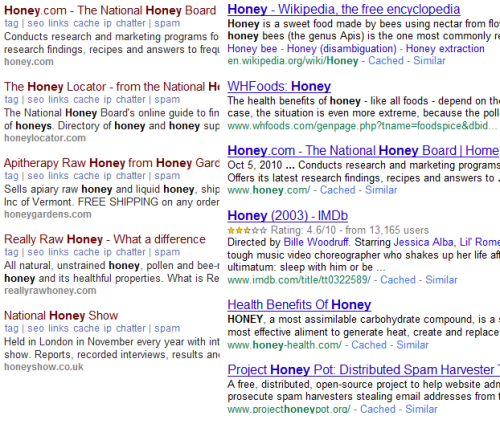Blekko, The “Slashtag” Search Engine, Goes Live
Blekko, the long anticipated search engine founded by Rich Skrenta, has finally opened to the public. The service offers an interesting way to “slash” or create specialty search engines for any topic, along with new features the company hopes will improve relevancy. My previous article, Blekko: New Search Engine Lets You “Spin” The Web, goes […]
Blekko, the long anticipated search engine founded by Rich Skrenta, has finally opened to the public. The service offers an interesting way to “slash” or create specialty search engines for any topic, along with new features the company hopes will improve relevancy.
My previous article, Blekko: New Search Engine Lets You “Spin” The Web, goes into great depth about the core features you’ll find at Blekko today, so I’d encourage you to read through that. Below, I’ll provide an update on a new features added since my review of Blekko was written in July, when the service opened to a small group of testers. I’ll also revisit where Blekko sits in terms of challenging Google.
Slashing Web Search Into Special Topics
Slashtags, as my previous article explains, are a way that anyone can make a “vertical” search engine around any topic. For those not familiar with the term, a vertical search engine is one that lets you search in a specific area of interest, rather than across the “horizontal” spectrum of all interests. Google is a “horizontal” search engine that lets you search for anything. Google News, in contrast, lets you drill into one slice of interest, news content.
While Google has a variety of specialized search engines of it own, there’s no easy way for a Google user to decide they want a “tea party” search engine, or a “liberal” search engine or a “comedy” search engine. Blekko allows this. You simply browse a list of topics to find the right slashtag to use. For example, this search:
Allows you to find web pages about the subject of “honey” but only from web sites that someone has picked that are related to the topic of bees. That means you avoid getting matches such as a movie called “Honey” or an open source spam tracking project, which Google turns up. Below, results for the same search from Blekko (on the left) and Google (on the right):
Again, my earlier article explains how anyone can use slashtags to create a version of Blekko that just searches in a specific area. Of, if slashtag for a topic hasn’t been created, then anyone can make their own.
Enter Auto-Slashing
What’s new since my last review is that Blekko is now automatically applying slashtags for searches in seven areas, even if you didn’t specifically request these. The areas are:
- autos
- colleges
- health
- hotels
- lyrics
- personal finance
- recipes
Why do this? Blekko told me earlier this month, when talking about the new feature, that it has found slashtags produce better results for these categories of searches. Using slashtags does a search against a set of hand-selected sites, which Blekko says eliminates spam and other irrelevant material.
The move makes a lot of sense. In fact, it’s exactly why Google introduced Universal Search back in 2007. Google’s system automatically “blends” matches from its specialized search engine, inserting news results, images search matches, product listings and more along with “regular” search results, as deemed relevant. In fact, just last week, Google Place Search launched, which dramatically boosts the visibility of local listings for relevant searches.
Auto-Slashing In Action
Does it work? When Blekko demoed a few examples with me, the results sometimes looked good. For example, Blekko highlights how a search for cure for headaches brings back matches from medical authority sites such as the US National Institutes Of Health or the UK’s National Health Service. In contrast, the same search at Google has in its top results answers from wikiHow, an ad-heavy “Headache Relief” site and a home remedies site.
The screenshot below show Blekko’s top results on the left and Google’s on the right:
In particular, Blekko is keen to emphasis that auto-slashing keeps “content farm” material from dominating search results (see our previous article, Google, Content Farms & Why This May Be Blekko’s Moment, for more about this).
Personally, I don’t see content farm material as all bad. Some of it can be helpful. Nor do I always see it dominating Google’s search results. But it has become a flashpoint for some, and a pitch that Blekko can be a content farm free search engine may draw in a specific audience.
Auto-slashing doesn’t always work. When I was talking with Blekko about the changes, I also tried some other searches where the auto-slashtags didn’t kick in when I expected them too or failed to improve much, even when they did.
Here’s an example for a search on New York hotels at Blekko and at Google where despite auto-slashing, Blekko doesn’t come out on top:
In the example above, Google gives me a nice list of actual hotels linked to a map. The results also gives me sites I know and trust such as TripAdvisor and Expedia. Blekko gives me some that look interesting to try but nothing that leaps out immediately as giving it better results that Google — and getting the UK version of Expedia listed, rather than the US version, was disappointing.
The bottom line here is don’t expect perfection from Blekko. This is a new service that still has lots of bugs to work out, plus plenty of improvements that any search engine has to make, as it matures naturally. It’ll have disappointments. It may also surprise you at times. But it’s well worth a look.
Postscript: Rich Skrenta got in touch after I wrote this to say a bug was preventing the auto-slashtag from working properly (see his comment below). But I’ve seen other cases where it still doesn’t help. Google And Blekko Head-To-Head: Blekko Lives To Fight Another Day from us today also does some comparisons, and Blekko doesn’t always win. Of course, searches tested there don’t have auto-slashing happening. The point is that Blekko doesn’t always get it right, auto-slashing or not. It’s still well worth trying, however.
Auto-Slashing & Humans
By the way, while anyone can create slashtags, those that get used for auto-slashing aren’t open for anyone to edit. Instead, Blekko’s own staff created and maintains them.
Over time, Blekko plans to expand the number of auto-slashtags, and it wants to have a “volunteer army” that will be involved. Think Wikipedia meets search, Blekko says.
A New Search Voice
One of the most encouraging things about Blekko is that it brings back a much needed alternative “search voice” into the space. Every search engine has its own “voice,” its own particular set of results that comes from the unique mixture of pages that it collects and the recipe — called the search algorithm — that it uses to rank and display its estimate of the best pages in response to particular searches.
Earlier this year, the US (and many countries in the world) had three major search voices: Google, Yahoo and Bing. However, Yahoo gave up its own voice to instead let Bing speak for it, by using Bing’s results, back in August. As a result, the world had fewer unique search voices than in the nearly fifteen years I’ve covered the space — only two.
I like having more voices, and Blekko puts a third one back into the mix. Of course, Ask.com remains out there as a pre-existing third voice. However, the future of Ask crawling the web, to produce its own search results, seems unlikely.
Ask.com started shifting more into a question & answer search engine in the middle of this year (Ask Comes Full Circle With “Q&A” Offering), and it seems almost inevitable that it would eventually give up its own crawling technology, especially when it has testing using Google’s own for some time.
Especially at a time when I’ve felt Google’s results have plenty of quality issues (Bing has them, too), it’s nice to have a third aggressive player in the space.
Can Blekko Find An Audience?
Of course, by no means do I expect Blekko to become a Google killer. Despite Google’s flaws, it works extremely well for millions of people each day. In contrast, Blekko faces long odds to get its name out there, not to mention the challenge of dealing with its own flaws.
Blekko comes into a space that’s already seen many of the “historic” or “old time” players get out of running their own search technology, Yahoo being one of the last of these.
The space is also littered with more recent companies that promised — or were seen by outsiders as promising — a new revolution in search. Names like Mahalo and Wolfram Alpha, the latter of which is especially interesting, but neither of which gained significant search market share. Then there’s Search Wikia, which closed after a year, or Cuil, which went offline last month.
Blekko is the last of these recent search challengers to finally launch. The brainchild of Skrenta, he brings to the game some long-time and realistic experiences in search, from his times as a cofounder of the Open Directory and of the Topix news search engines. His goal is to for Blekko to gain a small amount of search share — which potentially, is still a great business to have.
I think Blekko might indeed find an audience among the tech people who miss “old Google” or those who seek an alternative for when Google or Bing don’t come through. Special interest groups might also be attracted to the ability to create their own custom search engines. If anything, I think that’s Blekko’s ultimate strength, the ease in which specialty search engines can be made.
Time will tell. I’ll be watching with interest to the reaction, as the general public finally gets to use the new service.
Again, please be sure to read my previous article, Blekko: New Search Engine Lets You “Spin” The Web, which does a detailed look at the features you’ll be able to use today.
For related coverage from others, see Techmeme. Blekko’s Skrenta has its own blog post up about the launch here. Also see our two other pieces on Blekko that are out now:
- Google And Blekko Head-To-Head: Blekko Lives To Fight Another Day
- Blekko’s SEO Tools: What Information Do They Provide?
Postscript: I was asked about the /images slashtag and how it seemed to match Bing Image Search. That’s correct, Blekko says — its image search come from Bing.
Contributing authors are invited to create content for Search Engine Land and are chosen for their expertise and contribution to the search community. Our contributors work under the oversight of the editorial staff and contributions are checked for quality and relevance to our readers. The opinions they express are their own.
Related stories


